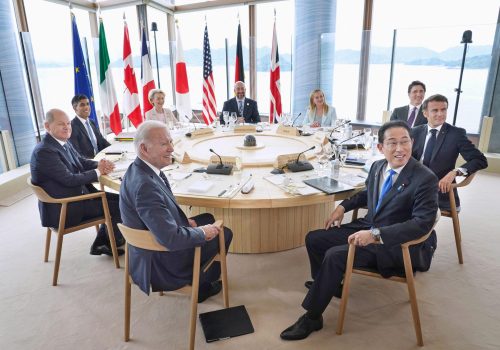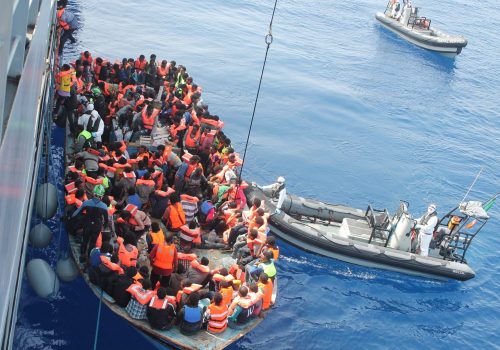Italy’s G7 presidency can be a breakthrough for the ‘West’ and the ‘Rest’
As it begins its Group of Seven (G7) presidency, Italy has an opportunity to leverage its unique historical and cultural perspective to act as a bridge-builder between the “West” and the “Rest” of the world. Indeed, it must do so, because a more inclusive and collaborative approach between these two blocs has become an imperative.
The dichotomy between the West and the Rest has come to the fore over the past few years, marked by the return of war in Europe and great power competition—embodied most clearly by the rivalry between China and the United States. Developed countries from the so-called geopolitical West have been rallying behind Ukraine and striving to consolidate the front against autocratic powers, asserting the value of rules-based international governance while reshaping their relations to fit the times. In parallel, a host of nonaligned nations have refrained from taking sides and have resisted the binary definition through which Western countries tend to see the world.
There’s a string of reasons why countries from the Rest do not see themselves reflected in the West’s approach, ranging from the purely commercial to the ideologically and historically motivated. A common critique is that the Western worldview often seems to conveniently align with Western interests, to the point that Western countries adopt double standards on adhering to the very rules they thrust upon emerging countries. The West-Rest division itself is historically rooted, and the bolstering of non-Western international fora seems to reinforce it. This includes the recent expansion of the Brazil, Russia, India, China, and South Africa grouping known as the BRICS.
Time and again, this West-Rest division has hindered collective efforts to address pressing global challenges. Beyond the tensions between major powers, economic disparities and structural mismatches have created a world in which collaboration is increasingly complex. As a result, shared issues—ranging from climate change and public health crises to economic inequalities—tend to end up on the back burner, behind national interests and country-specific priorities.
In addition, global governance has become a contentious issue, with competing visions seeking do define it. The pro–global governance liberal international institutionalist view has had a difficult time lately, to say the least. Concepts that until recently were indisputable dogmas seem to be under attack, if not relegated to the backseat of international politics. These include the essential role of the United Nations and the international community’s attempts to modernize it, empowerment of regional organizations such as the European Union and the African Union, the strengthening of international law and human rights protections, and the fostering of free trade and free movement of capital and people.
A more crude and realistic approach is emerging. Conflictual geopolitical blocs organized around nuclear superpowers and their hard power are rising, at least in the short and medium terms. Western nations must adapt to this change in the international environment and be ready to act swiftly to succeed. This rapidly developing situation may force Western populations to coalesce again around a strong definition of their values, vision, and ideals, which they want to adopt and then must follow rigorously. Western nations could turn to institutions such as the G7 to organize their actions to better face the challenges brought about by competition between blocs.
The road ahead goes through Rome
From its privileged position in the center of the Mediterranean, Italy has been taking stock of these asymmetries and looking at ways to shape a different trajectory.
Rome is already working on revamping traditional power structures and fostering a new ethos—one that envisions the West not in opposition to the Rest but as partners in a shared global endeavor. Italian diplomats have pushed for a reallocation and expansion of seats on the United Nations Security Council, for example, to strengthen regional representation through a fairer geographical distribution.
These efforts have coursed through the strengthening of diplomatic networks that Italy has been fostering in recent years. A prime example is its new strategic partnership with India and the excellent personal entente that Italian Prime Minister Giorgia Meloni has developed with her Indian counterpart, Narendra Modi, which has facilitated the African Union’s entry into the Group of Twenty (G20). Beyond New Delhi, Rome has expanded bilateral relations across the Indo-Pacific region, where rapidly emerging countries are vying to be heard at the global table.
In parallel, Meloni has spearheaded a major effort to redefine Italy’s relationship with African countries, ushering in a novel model of cooperation (which she hopes may be replicated by other European states) based on non-predatory, investment-based partnerships across industries, such as energy, infrastructure, and telecommunications, as well as in academia and the political sphere. This approach, dubbed the “Mattei Plan,” was unveiled as the centerpiece in the Italy-Africa Conference, held this week in Rome.
Cultural proximity and cross-fora cooperation between Rome and Brasilia constitute a fertile occasion to establish a deeper dialogue between the West and the BRICS, thus extending an olive branch to emerging powers, acknowledging their grievances and curbing the latter group’s drive to become an “anti-West” front.
In this sort of framework, the diversity of views can lead to more innovative approaches and nuanced solutions to complex issues such as climate change and economic inequalities. It can also expand opportunities for joint initiatives that can drive sustainable economic growth, while ensuring the benefits of growth are more equitably distributed on a global scale.
How Italy can set the agenda for cooperation
In practical terms, what should the West and the Rest work on together? As highlighted in the Mattei Plan, which features it as one of its five pillars, energy is a fruitful area for cooperation. Green energy and greentech, for example, are pathways to addressing climate change that double as a way to enhance supply chain resilience. Italy could make the case during its G7 presidency for more green energy and greentech investment in the Global South, which would allow those countries to tap into their natural resources, from fossil fuels and raw materials to solar and wind power, and develop their national industrial prowess, while diversifying the Global North’s energy supplies.
On the digital front, the avenue for cooperation is the technological “plumbing”—ranging from trustworthy telecoms infrastructure to privacy—and business-friendly international data transfer frameworks, not to mention chips and artificial intelligence tools. The latter two especially are among the most powerful drivers of growth, which still cannot materialize in the absence of an environment that’s conducive to investment—one of the main takeaways from the first Africa Climate Summit in Nairobi. In talking via international fora, national institutions must work to foster the conditions and offer guarantees so that money movers can unlock potential growth.
For this degree of cooperation to exist, recognizing and respecting cultural, structural, and political differences is paramount. Maintaining a high degree of transparency is also important to building trust and avoiding accusations of double standards. Boosted by the G7 presidency, Rome holds the right cards to foster an open environment that’s conducive to meaningful interaction, addressing disparities and promoting inclusive economic growth on a global scale.
Paolo Messa is a nonresident senior fellow at the Atlantic Council’s Transatlantic Security Initiative in the Scowcroft Center for Strategy and Security.
Karim Mezran is a resident senior fellow and the director of the North Africa Program at the Atlantic Council.
Further reading
Sat, May 20, 2023
Experts react: A ‘game changer’ G7 summit in Japan
New Atlanticist By
As leaders of the Group of Seven countries gather in Hiroshima, Atlantic Council experts share their insights on what is coming out of the summit about Russia, China, the global economy, and more.
Sun, Dec 10, 2023
Italy’s ‘arrivederci’ to China’s BRI could be a template for others
New Atlanticist By Valbona Zeneli
Italy opting out of China's Belt and Road Initiative is both a blow to the already scaled-back initiative and a signal of Prime Minister Giorgia Meloni's resolve.
Thu, Aug 3, 2023
Irregular migration from North Africa: Shifting local and regional dynamics
Report By
Irregular migration from North Africa to Europe, especially through the Central Mediterranean route connecting Libya and Tunisia to Italy, is increasing once more. Italy has witnessed a surge in irregular arrivals, with approximately 136,000 migrants disembarking between June 2022 and May 2023, almost comparable to the high arrival period of 2014-2017 when around 155,000 migrants landed each year.
Image: Italy's Prime Minister Giorgia Meloni attends a Partnership for Global Infrastructure and Investment event during the G7 summit, at the Grand Prince Hotel in Hiroshima, Japan, May 20, 2023. REUTERS/Jonathan Ernst


